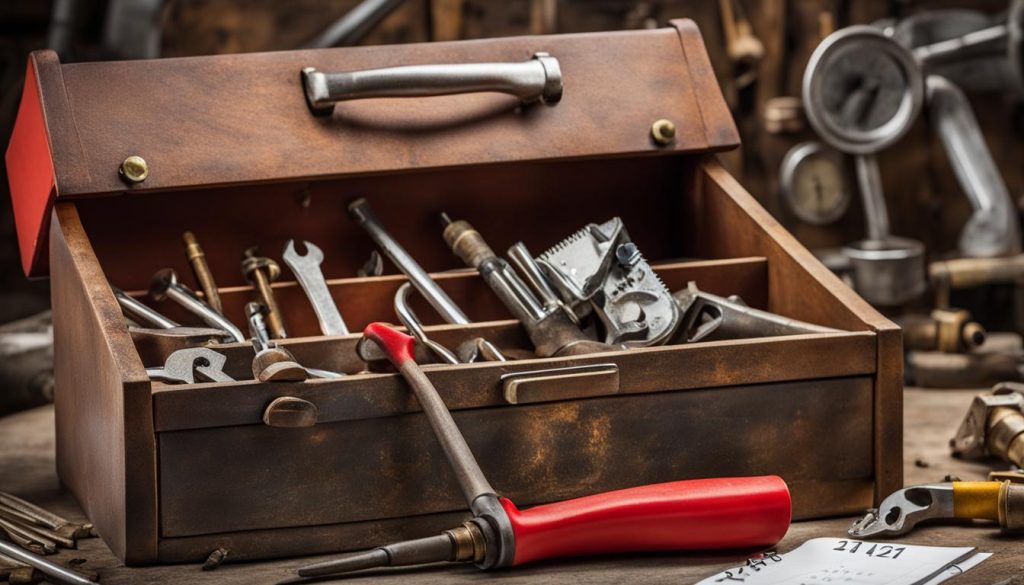Duration of Plumber Apprenticeship Explained
Did you know that a plumber apprenticeship in Canada typically lasts for five years, encompassing approximately 9,000 hours of training? That’s right, aspiring plumbers undergo extensive training to master their craft and become skilled professionals in the trade.
Key Takeaways:
- The duration of a plumber apprenticeship in Canada is typically five years.
- Apprentices complete approximately 9,000 hours of training, comprising on-the-job work experience and in-school training.
- The apprenticeship program is regulated by Skilled Trades Ontario and governed by the Building Opportunities in the Skilled Trades Act, 2021.
- Successful completion of the program leads to a Certificate of Apprenticeship issued by the Ministry of Labour, Training and Skills Development.
- Plumbing is a compulsory trade in Ontario, and individuals practicing the trade must hold the necessary certifications.
On-the-Job Training for Plumbers
As part of the plumber apprenticeship program, on-the-job training is an essential component that allows apprentices to gain practical experience and develop the necessary skills required in the plumbing trade. During this training, apprentices receive guidance and instruction from skilled workers or trainers who help them navigate the complexities of the profession.
The specific skills and competencies that apprentices must acquire are outlined in the trade’s Apprenticeship Training Standard, which serves as a guide for their training journey. These standards ensure that apprentices receive comprehensive and well-rounded instruction, covering all aspects of the plumbing trade.
Throughout their on-the-job training, apprentices work towards meeting specific training objectives and milestones. They learn to perform a variety of tasks, including:
- Installing and repairing plumbing systems
- Working with different pipe materials
- Understanding plumbing codes and regulations
- Interpreting blueprints and technical drawings
- Maintaining and troubleshooting plumbing fixtures
This hands-on experience allows apprentices to gain practical knowledge and refine their skills under the guidance of experienced professionals. They have the opportunity to apply their theoretical knowledge in real-world situations, building their confidence and competence as they progress through their apprenticeship.
In-School Training for Plumbers
In addition to on-the-job training, plumber apprentices also undergo in-school training. This theoretical training is delivered in three levels and covers various aspects of the trade, including workplace safety, pipe and fitting materials, plumbing fixtures, water distribution systems, and more.
The duration of in-school training can vary depending on the training delivery agency. It may be offered through:
- Block release (full-time for a set number of weeks)
- Day release (one day per week)
- Part-time (night-school programs)
- Alternative delivery methods such as online or correspondence courses
During the in-school training, apprentices learn essential theoretical knowledge and develop the skills necessary to complement their on-the-job experience. This combination of practical and theoretical training equips them with a comprehensive understanding of the plumbing trade.
Here is an example of how the in-school training for plumbers might be structured:
| Level | Course Topics | Duration |
|---|---|---|
| Level 1 | Introduction to Plumbing, Workplace Safety, Pipe and Fitting Materials | 12 weeks |
| Level 2 | Drainage Systems, Water Distribution Systems, Plumbing Fixtures | 10 weeks |
| Level 3 | Fire Protection Systems, Gas Systems, Advanced Plumbing Techniques | 8 weeks |
This structured approach ensures that apprentices receive a comprehensive education that covers the fundamental concepts and practical skills necessary to excel in the plumbing trade.
Opportunity for Specializations
During the in-school training, apprentices often have the opportunity to explore different areas of specialization within the plumbing trade. This allows them to gain additional skills and knowledge in specialized areas such as hydronics, backflow prevention, or sustainable plumbing practices.
By pursuing these specialized courses, apprentices can enhance their expertise and broaden their career opportunities in the plumbing industry.
Certification and Red Seal Program
Once aspiring plumbers have successfully completed the required hours of on-the-job and in-school training, they must undertake a certifying exam administered by Skilled Trades Ontario. Passing this exam leads to the prestigious Certificate of Qualification in the plumbing trade.
It is important to note that plumbing is a compulsory trade in Ontario, meaning that individuals practicing the trade must hold a Registered Training Agreement, Provisional Certificate of Qualification, or Certificate of Qualification. Compliance with these requirements is essential for those aspiring to become professional plumbers in the province.
The plumbing trade is also part of the Interprovincial Red Seal Program, which establishes standardized national standards for the plumbing trade across Canada. The Red Seal endorsement signifies a journeyman’s qualification and provides recognition of their skills and expertise beyond provincial borders.
Please note that the image is only a representation and may not reflect the exact details of the certification and Red Seal Program in Ontario.
Apprenticeship Program in Alberta
In Alberta, the plumber apprenticeship program spans four years, divided into four 12-month periods. Aspiring plumbers are required to complete a minimum of 1560 hours of on-the-job training and attend eight weeks of classroom instruction each year.
During the apprenticeship program, students gain hands-on experience working alongside experienced plumbers, honing their skills and developing practical expertise in various plumbing tasks.
Furthermore, apprentices in Alberta have the opportunity to pursue dual certification, earning two Alberta Journeyperson Certificates upon successful completion of the program. These certificates acknowledge proficiency in both plumbing and gasfitting, class B.
As part of their training, apprentices also have the option to write both the plumber and gasfitter, class B interprovincial exams, affording them the chance to secure Red Seal Endorsements. This nationally recognized endorsement further bolsters their qualifications and opens up various job prospects across Canada.
In Alberta’s apprenticeship program, individuals acquire the necessary skills, theoretical knowledge, and practical experience to become competent plumbers who are well-equipped to thrive in the industry.
Apprenticeship Program Summary in Alberta
| Program Duration | On-the-Job Training | In-Class Instruction | Certificates Earned |
|---|---|---|---|
| 4 years (four 12-month periods) | Minimum 1560 hours | 8 weeks per year | Alberta Journeyperson Certificate – Plumbing and Gasfitter, class B |
Progress and Certification in Alberta
As an apprentice in Alberta, I understand the importance of demonstrating progress in my apprenticeship program. Within 18 months, I am expected to actively engage in activities that contribute to completing a period in the program. This progress is crucial for advancing in the trade and eventually becoming a journeyperson plumber.
Upon reaching the final period of my apprenticeship training, I will have the opportunity to attempt the Interprovincial Exam. This exam evaluates my knowledge and skills in plumbing and, upon successful completion, grants me a Red Seal endorsement.
The Red Seal is a nationally recognized certification that signifies my qualification as a skilled journeyperson plumber. It validates my expertise and opens up numerous career opportunities across Canada.
Alternate Route: Trades Qualifier
In addition to completing the apprenticeship program, apprentices who have acquired significant work experience in the plumbing trade may choose the Trades Qualifier route. This route allows me to apply for a Journeyperson Certificate based on my practical knowledge and skills.
By submitting an application and showcasing my expertise, I can demonstrate that I am qualified as a journeyperson plumber, even without completing the full apprenticeship program.
The plumber apprentice program in Alberta provides a comprehensive path to certification and advancement in the plumbing trade. Whether I choose to follow the traditional apprenticeship program or explore the Trades Qualifier route, I can be confident in the value of my training and the recognition of my skills as a journeyperson plumber.
Opportunities and Careers in Plumbing
Upon completing the required apprenticeship training, plumbers have various career opportunities. They can work in residential, commercial, and industrial buildings, installing, repairing, and maintaining plumbing systems and fixtures. Plumbers can be employed in maintenance departments, plumbing contractors, or choose to become self-employed. The field offers stable job prospects, and individuals interested in pursuing a career in plumbing can visit the Government of Canada website for more information on related occupations and job market trends.
| Career Paths | Job Responsibilities | Average Salary |
|---|---|---|
| Residential Plumber | Install and repair plumbing systems in homes | $50,000 – $80,000 per year |
| Commercial Plumber | Work on plumbing projects in commercial buildings | $60,000 – $90,000 per year |
| Industrial Plumber | Handle complex plumbing systems in industrial settings | $70,000 – $100,000 per year |
| Maintenance Plumber | Perform routine maintenance and repairs on plumbing systems | $45,000 – $70,000 per year |
| Self-Employed Plumber | Run your own plumbing business and work on various projects | Varies depending on business success |
Program Details in Ontario
Are you considering a career in plumbing? The plumbing apprenticeship program in Ontario provides a comprehensive and regulated pathway to becoming a skilled plumber. With approximately five years of training, totaling 9,000 hours, this program equips you with the knowledge and hands-on experience necessary for success in this trade.
During the plumber apprenticeship program in Ontario, you will spend 8,280 hours gaining valuable on-the-job work experience. This allows you to develop the practical skills required to excel in the plumbing industry. Additionally, you will receive 720 hours of in-school training, where you will learn the theoretical foundations and best practices of the trade.
To accommodate different learners’ needs, in-school training can be delivered through various methods, including block release, day release, part-time, and alternative delivery formats. This flexibility ensures that you can balance your training with other commitments while still receiving quality education and instruction.
Upon successful completion of the program, you will be awarded a Certificate of Apprenticeship by the Ministry of Labour, Training and Skills Development, recognizing your dedication and achievement in becoming a qualified plumber. This certification opens doors to a wide range of job opportunities in residential, commercial, and industrial settings.
- Investing Wisely: How Windows & Doors in Boost Property Value and Financial Health - April 24, 2025
- The Financial Impact of Personal Injuries: Why Legal Help Matters for Business Owners - April 16, 2025
- The Hidden Financial Costs of Domestic Assault: What Business Owners Need to Know - April 16, 2025













